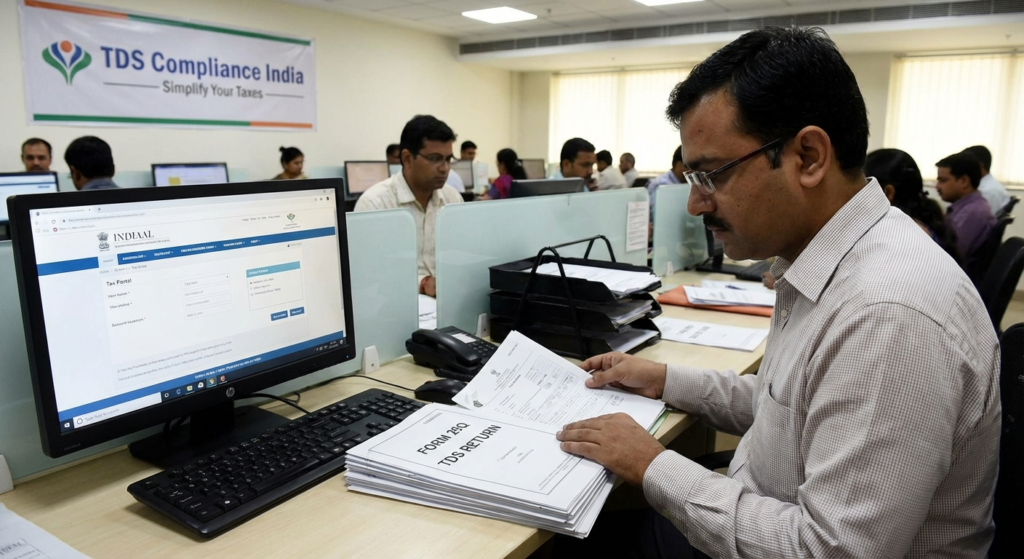Are you dreaming of starting a business in India? The first big step is to register your company name. This step is key to your business’s legal identity. But, you might wonder about the details of this process. How do you make sure your business name fits your brand and meets India’s legal standards?
This guide will take you through the steps to register a business name in India. We’ll cover understanding business structures, reserving a unique name, and the legal steps. By the end, you’ll know how to register your business with confidence and set a solid base for your venture.
Key Takeaways
- Learn about the business structures in India, like sole proprietorship, partnership firms, one-person companies, and limited liability partnerships.
- See why picking the right business structure is important for your goals and legal needs.
- Find out how to reserve a unique business name, including checking if it’s available and securing it.
- Get to know the legal steps, like getting a Digital Signature Certificate (DSC) and a Director Identification Number (DIN).
- Discover the perks of registering your company in India, such as legal recognition, limited liability, and access to financial services.
Understanding Different Business Structures in India
Starting a business in India means picking from several legal structures. Each has its own perks and rules. Knowing these options helps you pick the best one for your goals and needs. Let’s look at the main choices:
Sole Proprietorship
A sole proprietorship is the simplest business type. One person owns and runs the whole business. You have full control and keep all profits. But, you’re also liable for any losses.
This structure is great for small businesses needing little investment.
Partnership Firm
A partnership firm has two or more people starting a business together. They share profits and losses. It’s governed by the Partnership Act, 1932. This is good for small businesses with several owners and low investment.
One Person Company (OPC)
The One Person Company (OPC) was introduced in 2013. It lets one person run a business in a corporate setup. An OPC is under the Companies Act, 2013. It’s perfect for small businesses with one owner wanting limited liability.
Limited Liability Partnership (LLP)
A Limited Liability Partnership (LLP) is a legal entity where partners’ risks are limited to their agreed shares. It blends partnership and company features. This makes it great for businesses with several partners wanting limited liability.
Private Limited Company (PLC)
A Private Limited Company (PLC) is a legal entity separate from its founders and owners. Directors manage the company, and owners invest in it. PLCs are under the Companies Act, 2013. They’re ideal for medium to large businesses looking to raise funds.
Public Limited Company
A Public Limited Company has seven or more members under the Companies Act, 2013. It has its own legal identity, and members’ liability is limited to their shares. Public Limited Companies are for medium to large businesses wanting public funding.
Choosing the right business structure in India depends on your operation size, liability comfort, and future goals. Understanding each structure’s unique aspects helps you make a smart choice for your business’s success.
| Business Structure | Minimum Members | Minimum Capital | Key Features |
|---|---|---|---|
| Sole Proprietorship | 1 | No minimum capital | Simple, low-cost, full control for the owner |
| Partnership Firm | 2 | No minimum capital | Shared profits and losses, regulated by the Partnership Act |
| One Person Company (OPC) | 1 | ₹1 lakh | Allows a sole proprietor to operate within a corporate framework |
| Limited Liability Partnership (LLP) | 2 | ₹1 lakh | Combines features of a partnership and a company, limited liability |
| Private Limited Company (PLC) | 2 | ₹1 lakh | Separate legal entity, managed by directors, shareholders own part of the company |
| Public Limited Company | 7 | ₹5 lakhs | Separate legal entity, shares can be traded publicly, suitable for medium to large businesses |
For more info on registering your business in India, check out My Digital Filing. They’re experts in company registration and compliance services.
Importance of Choosing the Right Business Structure
Picking the right business structure is key. It affects your legal needs, taxes, and how big your business can grow. The structure you pick changes how easy it is to get money, who is liable, and how your company works and makes money. It’s important to look at the good and bad of each structure to pick one that fits your goals and how much risk you can take.
In India, you have several business structures to choose from:
- Sole proprietorship
- Partnership firm
- One Person Company (OPC)
- Limited Liability Partnership (LLP)
- Private Limited Company (PLC)
- Public Limited Company
The business structure you pick affects your taxes, who is liable, and how big you can grow. Sole proprietorships are simple and save on taxes but make you personally liable. Limited companies like private and public ones protect you from personal liability and help you raise money but have more rules to follow.
“The best business structure for you depends on your business size, how much risk you can take, and your goals.”
Choosing the right business structure is very important. It helps you follow the law, lowers risks, and sets you up for long-term growth. My Digital Filing can help you pick and register the best structure for your business.
| Business Structure | Pros | Cons |
|---|---|---|
| Sole Proprietorship |
|
|
| Partnership |
|
|
| Limited Company Structure |
|
|
How to Register a Business Name in India
Before you register your business name in India, make sure it’s not taken. Check the business name availability on the Ministry of Corporate Affairs (MCA) portal. This site lets you search for names already used, trademarks, and Limited Liability Partnerships (LLPs). This way, you can pick a name that’s unique and doesn’t break any rules.
Checking for Name Availability
After finding your desired business name is free, the next step is to reserve the business name with the MCA. Use the Reserve Unique Name (RUN) service on the MCA portal to apply and lock in your name. This keeps your name safe and stops others from taking it while you register your company.
Reserving the Desired Name
By following these steps to check business name availability and reserve the business name, you protect your desired name. This makes it easier to register your company in India. Remember, a unique and memorable name is key for your brand identity and standing out in the market.
“The right business name can make all the difference in your company’s success. Take the time to find a name that truly reflects your brand and resonates with your target audience.”
At My Digital Filing, we know how important a strong business name is. Our experts can help you with checking business name availability and reserving the business name in India. We make sure your company registration is smooth and easy.
Key Steps for Company Registration in India
Registering a business in India is easy and can be done online. First, get a Digital Signature Certificate (DSC) for your company’s directors and subscribers. This DSC is needed for filing forms on the MCA portal.
Applying for Director Identification Number (DIN)
Next, apply for a Director Identification Number (DIN) for your company’s directors. This unique number is a must for directors. Include it in the SPICe+ form when you file it on the MCA portal.
Registering on the MCA Portal
Before registering your company, the director(s) must register on the MCA portal. This gives them access to services like filing forms and viewing documents online. It’s a key step in registering your company.
Filing SPICe+ Form and Obtaining Certificate of Incorporation
Fill out and submit the SPICe+ form on the MCA portal. This form covers many registration tasks, like name reservation and DIN application, all in one. After approval, you’ll get the Certificate of Incorporation, making your company official.
Follow these steps to register your company in India easily and get the legal approvals you need.
| Step | Description |
|---|---|
| 1. Obtain Digital Signature Certificate (DSC) | Directors and subscribers need a DSC from approved authorities. |
| 2. Apply for Director Identification Number (DIN) | Directors must get a unique DIN, which goes in the SPICe+ form. |
| 3. Register on the MCA Portal | Directors register on the MCA portal for services and filing forms. |
| 4. File SPICe+ Form | The SPICe+ form covers many tasks, like name reservation and DIN application. |
| 5. Obtain Certificate of Incorporation | After approval, the Registrar issues the Certificate of Incorporation. |
Follow these steps and use the Ministry of Corporate Affairs’ online services to register your company smoothly. For more help, visit the My Digital Filing website. It offers solutions for digital signature certificate, DIN application, and MCA portal registration to make registration easier.
Benefits of Company Registration in India
Registering your business as a company in India brings many benefits of company registration. These benefits help your business grow and succeed over time. Some main advantages of company registration are:
- Establishing a separate legal entity: A registered company is seen as its own legal entity. This means it has limited liability protection.
- Perpetual succession: The company keeps going even if the people in charge change. This ensures the business keeps running.
- Transferability of shares: You can easily change who owns the company by selling or trading shares. This helps your business grow and find new investors.
- Access to financing: Companies, especially Private Limited and Public Limited ones, can get more financing. This includes venture capital, private equity, and going public.
- Enhanced credibility and trust: Being a registered company makes you look more credible and trustworthy. This is good for your business’s reputation and how it works with others.
At My Digital Filing, we know how important company registration is. We can help you register your business the right way, making sure it follows all the rules. Let us show you the benefits of company registration and help your business do well.
Registering a Private Limited Company in India
Registering a private limited company (PLC) in India is easy and follows a few steps. First, get a Digital Signature Certificate (DSC) for the directors. Then, apply for a Director Identification Number (DIN). After that, reserve your company name on the Ministry of Corporate Affairs (MCA) portal.
With everything ready, prepare the Memorandum of Association (MoA) and Articles of Association (AoA). These documents detail the company’s goals, how it will be managed, and its rules. Then, file the SPICe+ form on the MCA portal with all the needed info and documents.
After approval, you get the Certificate of Incorporation. It includes your company’s Permanent Account Number (PAN) and Tax Account Number (TAN). This completes the register private limited company process. Now, you can open a bank account and get any licenses or permits your business needs.
To register private limited company in India, just follow these steps. If you need help, contact My Digital Filing. They are experts in company registration and business services in India.
“Registering a private limited company in India has never been easier. With the right guidance and support, you can navigate the process with confidence and focus on building your business.”
Conclusion
Registering a business in India is key for entrepreneurs wanting a successful and legal business. You need to know the different business types, pick the best one, and follow the steps for registration. This guide has covered important topics like reserving a unique name, getting documents like the DSC and DIN, and registering online on the MCA portal.
Having a well-planned and registered business helps it grow and succeed over time. If you need help with registering your business, My Digital Filing (https://mydigitalfiling.in/) offers reliable services for a smooth process.
Understanding the requirements and following the steps carefully sets your business up for success in India. With the right structure, legal recognition, and funding options, your business can grow and thrive.
FAQ
Q: What are the different business structures available in India?
A: In India, you can choose from several business structures. These include sole proprietorship, partnership firms, One Person Company (OPC), Limited Liability Partnership (LLP), Private Limited Company (PLC), and Public Limited Company.
Q: What are the advantages of registering a company in India?
A: Registering a company in India has many benefits. It creates a separate legal entity, ensures perpetual succession, and allows for share transfer. It also opens doors to financing, boosting credibility, and trust.
Q: How do I check the availability of my desired business name?
A: To see if your business name is available, use the Ministry of Corporate Affairs (MCA) portal. It lets you search for existing names, trademarks, and LLPs. This way, you can make sure your name stands out.
Q: What documents are required to register a Private Limited Company in India?
A: For a Private Limited Company in India, you need a Digital Signature Certificate (DSC) for directors. You also need a Director Identification Number (DIN), to reserve your company name, and to prepare the Memorandum of Association (MoA) and Articles of Association (AoA). Finally, you must file the SPICe+ form on the MCA portal.
Q: What is the step-by-step process for registering a business in India?
A: Registering a business in India involves several steps. First, get a Digital Signature Certificate (DSC) for directors. Then, apply for a Director Identification Number (DIN). Next, reserve your company name.
After that, prepare the Memorandum of Association (MoA) and Articles of Association (AoA). File the SPICe+ form on the MCA portal. Finally, you’ll get the Certificate of Incorporation.
Please Rate this post
Click to rate










